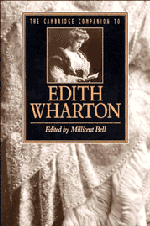Book contents
- Frontmatter
- Introduction
- 1 The Social Subject in The Age of Innocence
- 2 Edith Wharton and the Science of Manners
- 3 Edith Wharton and Race
- 4 The Custom of the Country
- 5 The Female Conscience in Wharton's Shorter Fiction
- 6 Law, Language, and Ritual in Summer
- 7 The House of Mirth
- 8 The Fruit of the Tree
- 9 The Valley of Decision
- 10 Edith Wharton's Valley of Decision
- Bibliography
- Index
- Series List
3 - Edith Wharton and Race
Published online by Cambridge University Press: 28 May 2006
- Frontmatter
- Introduction
- 1 The Social Subject in The Age of Innocence
- 2 Edith Wharton and the Science of Manners
- 3 Edith Wharton and Race
- 4 The Custom of the Country
- 5 The Female Conscience in Wharton's Shorter Fiction
- 6 Law, Language, and Ritual in Summer
- 7 The House of Mirth
- 8 The Fruit of the Tree
- 9 The Valley of Decision
- 10 Edith Wharton's Valley of Decision
- Bibliography
- Index
- Series List
Summary
This chapter investigates two things. It looks at erasure of race in Wharton's writing, the ostensible nonexistence of race as a category despite the fact that Wharton lived at a time and led her life in such a way that racial difference was an inescapable part of life. Second, it is about the actual, important presence of race as a category in Wharton's work once we pay attention to her inclusion of color and, even more subtle, her representation of whiteness as racial. (That is, this essay asks readers to move beyond the dominant-culture practice of defining race only as that which belongs to nonwhites.) To paraphrase Toni Morrison in Playing in the Dark: Whiteness and the Literary Imagination (1992), my first concern might be expressed: What do we make of Edith Wharton's positing her “writerly self” as “unraced” - without racial signification - in a culture obsessed with racial designation? My second might be phrased: How does our reading of Wharton and of Wharton texts change when we understand whiteness not as nothing, or as an absence, but as the presence of constructed racial meaning?
- Type
- Chapter
- Information
- The Cambridge Companion to Edith Wharton , pp. 68 - 86Publisher: Cambridge University PressPrint publication year: 1995
- 6
- Cited by

